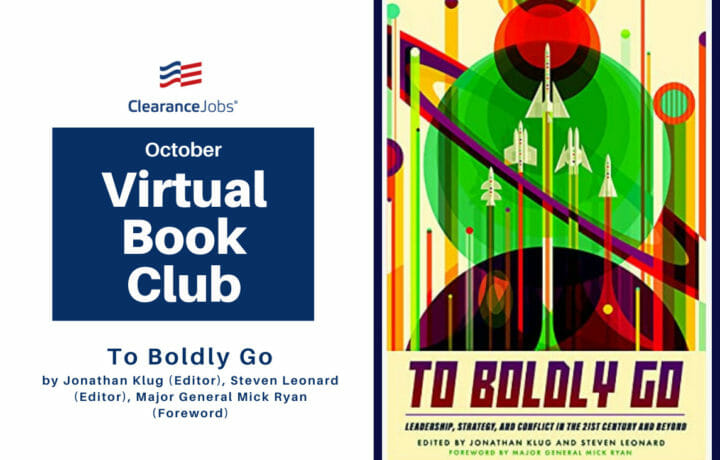What does the world of science fiction have to teach us about leadership and strategy? “To Boldly Go: Leadership, Strategy, and Conflict in the 21st Century” is an ambitious effort that applies a diverse range of voices in unpacking how the nuance and narrative of science fiction teaches lessons for today’s managers, military leaders and science fiction fans. And it’s our October ClearanceJobs Book Club pick.
Interested in reading “To Boldly Go”? The first five people to email lindy.kyzer@clearancejobs.com will receive a free copy of the book!
“To Boldly Go” is edited by Steve Leonard and Jonathan Klug. Leonard is no stranger to the sci-fi and fiction genre – he has written chapters in “Strategy Strikes Back: How ‘Star Wars’ Explains Modern Military Conflict” and “Winning Westeros: How ‘Game of Thrones’ Explains Modern Military Conflict.” Leonard is also a ClearanceJobs contributor and the creator of the Doctrine Man!! military comic series. Given this background, it’s no surprise that Leonard takes a lighthearted approach to the deep topics of strategy and leadership. That background also points to Leonard’s success in editing “To Boldly Go,” a project that involved a deep dive into a number of sci-fi genres and consolidating a diverse range of voices. Leonard also authored three of the book’s chapters.
ClearanceJobs asked Leonard to describe more about the project.
To Boldly Go – it’s not your first project herding cats editing contributions from a variety of authors – talk about the editing process versus just putting pen to paper yourself? How does a leadership book benefit from all of the distinct voices, and what are the challenges?
Anthologies take a lot of up front organization and pretty relentless timelining. Not that that’s different from a single-author work, but when you’re dealing with 30+ contributors, it tends to create a lot of parallel steams of effort that have to be managed individually. Probably the best example of this is knowing how you want to “bin” chapters into themed sections; if you don’t have a clear idea of what the end product should look like, you end up with chapters that are all over the map. That said, having 30+ contributors also ensures that you have 30+ unique voices, perspectives, and opinions. That makes the final product even richer, which equates to sales, I think.
Book chapters are like children – we all have a favorite – which chapter(s) really spoke to you or would you consider ‘must-have leadership’ reading?
All of the chapters bring something special to the reader. I think both Max Brooks and Kera Rolsen are great examples of chapters that exemplify why this is first and foremost, “must” leadership reading. They address long-standing systemic issues, but do so in a way that is both brilliant and subtle. If you’re not paying really close attention, you’ll learn something.
Why is sci-fi a worthy genre for exploring topics of military leadership and strategy?
Science fiction – any good fiction, really – allows you to explore contemporary issues through a fictional lens – so you can freely think about but do so in a “protected” space that isn’t “real.” If you look at the original Star Trek series, for example, they were exploring issues of race, gender, conflict… all under the guise of pulp sci-fi. You could watch an episode dealing with the Klingons and the Federation arming different sides of a galactic war and not realize you were really seeing proxy wars being debated. You could take in Planet of the Apes and not recognize that the movie was really dealing with issues of class struggle or anti-semitism. It’s a great genre for using the unexpected to allow you to think through real world issues.




